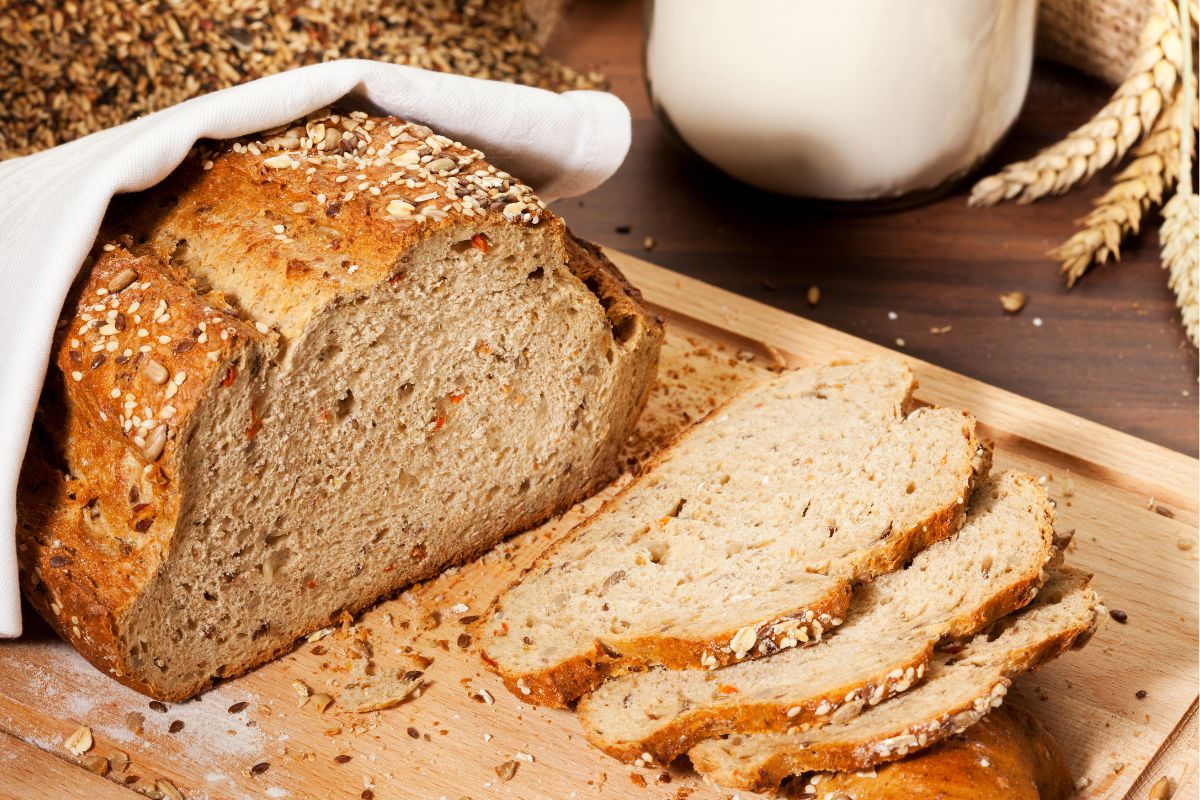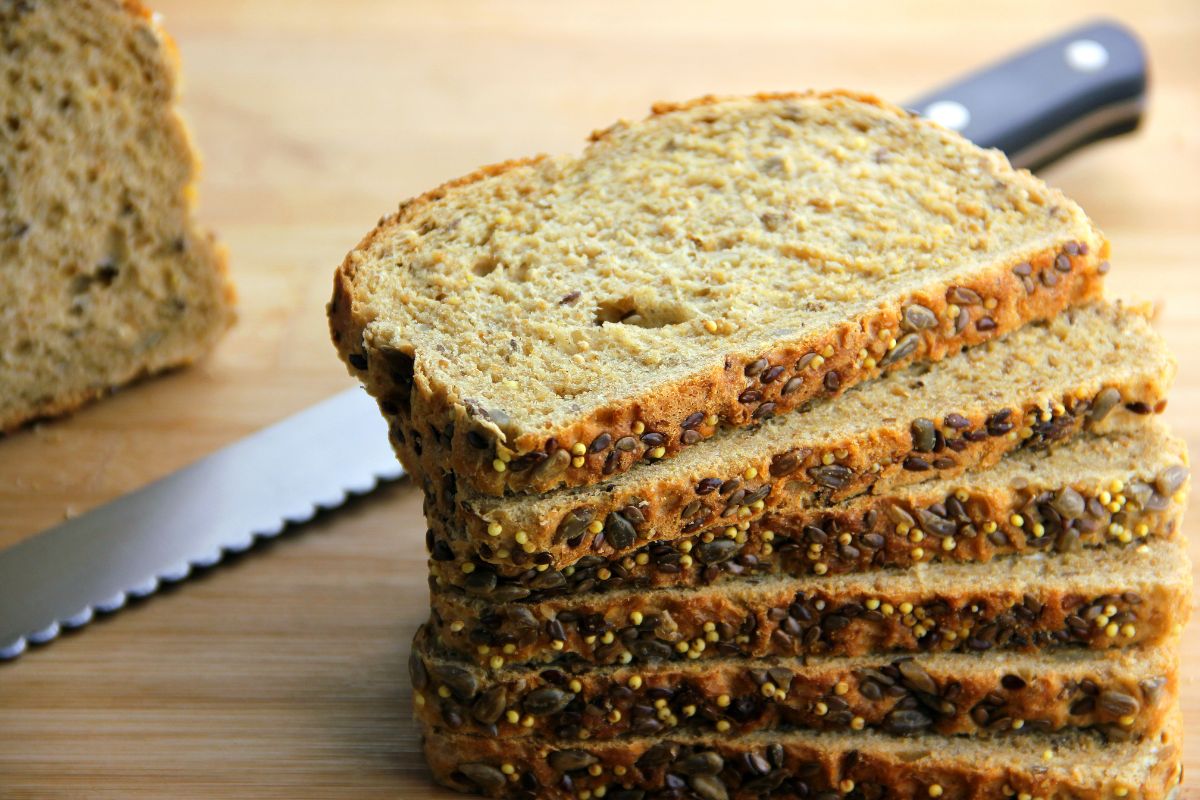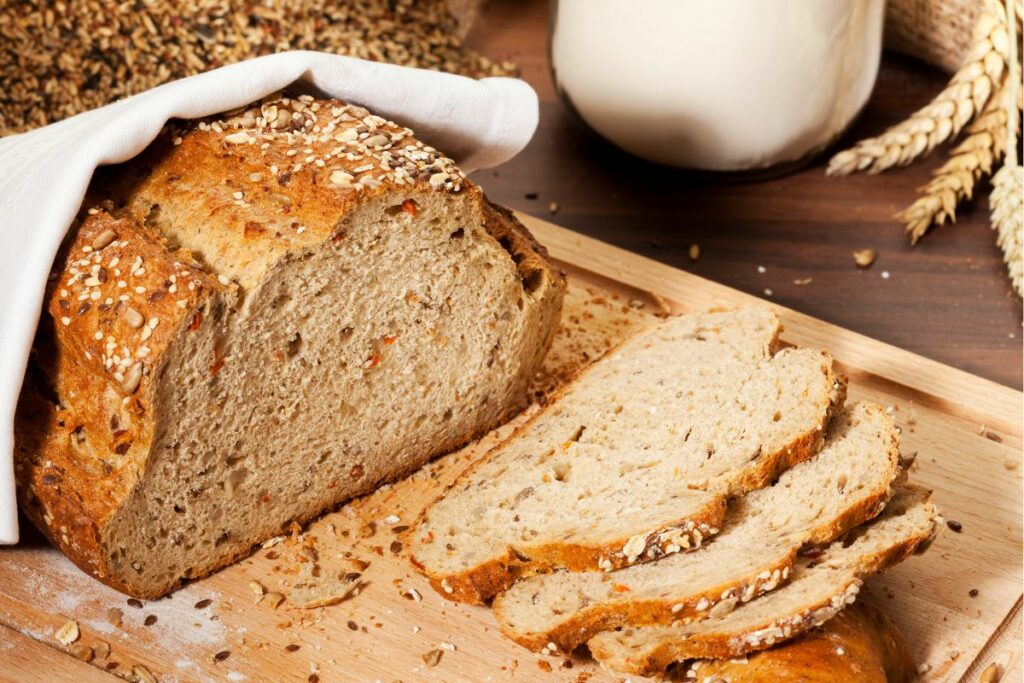Most of us eat bread every day. From a quick lunchtime snack with a sandwich to crispy bread on the side for dinner, bread is one of the most popular foods in the world.

But as we eat so much bread, is there bread that is healthier than others? Whole grain is often promoted as a healthy alternative to the stand white bread.
But is whole grain white bread healthy? We take a look at whole grain is and its health benefits.
What Is Whole Grain?
All wheat and grain products are known as healthy addition to a diet, including blood sugar control, improved heart health and weight management.
The biggest difference between whole wheat (normal white bread) and whole grain is the different type of grain used to make the product.
To understand more about this, let’s take a look at the individual grains. Both whole wheat and whole grain are grain kernels which are made up of three components: the bran, the germ and the endosperm.
The bran is the fibrous outer layer of the grain kernel. It is packed with minerals and vitamins, such as vitamin B.
The germ is the reproductive part of the kernel which contains a range of nutrients, including vitamin E, antioxidants, B vitamins and healthy fats.
The endosperm is the largest part of a grain kernel. It is made up of starchy carbohydrates. That’s why, the endosperm of a grain is typically used for making white flour.
Bread is labelled whole grain or whole wheat when the manufacturer uses the entire kernel.
The specific term whole wheat refers to the use of the whole grain kernel from the wheat plant.
In comparison, whole grain bread can also contain other full grain flour from barley, amaranth, millet, corn, rice, quinoa, rice, sorghum and sometimes even wheat (Find out Is Amaranth Gluten-Free?).
But whatever grain is used from the different plant, the miller always uses all components of the grain.
Is Whole Grain White Bread Healthy?
There is unfortunately no clear answer here. Many nutritionists believe that whole grain is healthier than other breads.
This means that whole grain white bread may have health-promoting benefits. However, not all breads are the same.
Different whole grain products contain different other ingredients that do not support these health benefits.
For example, if your white whole grain bread also has some whole wheat flour added then this increases the nutrient content of the bread.
As a rule of thumb, many whole grain breads, including white whole grain bread, is healthier than the standard white bread which is highly processed.
For the full details about the nutrients in a bread product, it’s best to read the label and make sure that it states the term whole.
If it doesn’t say whole grain or whole wheat on the packet, then the bread doesn’t contain any whole grain flour making it slightly less nutritious.
Health Benefits Of Whole Grains

Let’s take a closer look at the individual health benefits of whole grains, and with this, also whole grain bread.
High In Fiber And Nutrients
Whole grains are packed with essential nutrients that our body needs to function properly. These including minerals, vitamins, protein and fiber.
Lowered Risk Of Heart Disease
Studies showed that whole grains lower the risk of heart diseases which lead to an ever-increasing number of death across the world.
Scientists found that a good diet that supports the heart should include fewer refined grains, and more whole grains.
Lower Risk Of Stroke
Different studies discovered that whole grains can lower the risk of a stroke by up to 15%.
This is thanks to certain compounds in the kernel, including vitamin K, fiber and antioxidants.
Reduced Risk Of Obesity
Eating foods that contain lots of fiber means that you will fuller much faster, and this prevents you from overeating.
As whole grain products contain a large amount of fiber, they are the ideal ally to protect you from obesity.
Lower Risk Of Type 2 Diabetes
A study found that eating whole grains instead of refined grains leads to a much lower risk of type 2 diabetes.
This is thanks to the fiber-rich content of the grain kernels, which also help you control your weight and manage the risk of heart disease.
Support Healthy Digestion
The higher fiber content in whole grains aids the digestive system in a number of different ways.
Fiber lowers the risk of constipation, and it also acts as a probiotic meaning they feed your beneficial gut bacteria which are essential for a healthy digestion (You might want to check out Is Oatmeal Is Good For Constipation Here).
Reduce Chronic Inflammation
Chronic inflammation is quickly becoming one of the top diseases worldwide. Some studies found evidence that indicates that whole grains can reduce inflammation in the body.
This has led to recommendations from food experts and researchers to replace refined grain products with whole grains.
Possible Reduced Risk Of Cancer
While there have been some studies related to a reduced cancer risk from the consumption of whole grains, the results were mixed and not clear.
Currently, researchers believe that whole grains’ benefits are acting against colorectal cancer, and there may be some indication that it also helps to prevent other cancers.
Link To Reduced Risk Of Premature Death
Studies suggest that the intake of whole grain products can lower the risk of dying.
With the reduced risk of chronic diseases, such as obesity, inflammation and stroke, then the risk of dying earlier does come down as well.
Is Whole Grain Bread Healthier Than Whole Wheat Bread?
As both whole wheat and whole grain use the entire kernel, they are both nutritious.
Both of these whole kernel products have the same positive health benefits as they both contain healthy fats, fiber and nutrients which come from the bran, germ and endosperm of the grain.
In comparison, refined grains typically do not contain the germ and bran of the kernel which means bread made with refined grains does not have the same health benefits.
Conclusion
Compared to normal bread, whole grain bread is generally healthier, whether it is lighter or darker.
With the many healthy benefits from its high fiber content, whole grains are almost certain to become a staple of a healthy diet.








